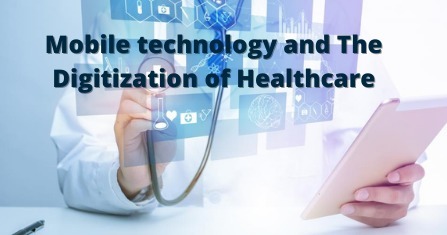Within these early years of the 21st century, we have witnessed remarkable technological progress with the developments of powerful and portable computing devices. Simultaneously, a global connection resulting from broadband and satellite technologies has resulted in an increasing number of ‘connected users’ for information sharing.
The emergence of new mobile health (mHealth) technologies has resulted from the temporal intersection of several coincidental movements: (i) an urgent need to address the rising burden of chronic diseases; (ii) Moore's law—the exponential increase in computing power resulting in the development of smaller and cheaper mobile electronics1; and (iii) shifting healthcare model to an increasingly patient-centric designs.2 mHealth is defined by the practice of medicine supported by portable diagnostic devices.
Use of these devices at the point-of-care is resulting in a change in the method of healthcare delivery from one that was health-systems generated to one that is remote and patient generated.3,4 The culmination of these factors presents unparalleled opportunities to increase patient engagement, to reduce healthcare costs, and to improve outcomes.
To reach the transformative potential of mHealth, a great deal of validation of the technical capabilities and accuracy, as well as the clinical impact of these technologies, is needed before we know they are effective. The real-world practice of medicine is complex and raises important questions on how we can generate clinically meaningful digital health data. Clinicians are beginning to enquire whether more devices necessarily mean more information and if some information may be redundant or even unnecessary.
As mHealth devices become increasingly available, three important questions arise: who should be the first digital health adopter: the patient, the provider, or the healthcare system? What factors of mHealth are most effective? And what is the evidence supporting the clinical utilization of such devices? As we aim to determine the effectiveness of these technologies, what are the outcomes—morbidity and mortality—or are patient-generated outcomes such as quality of life equally important?
Are patients prepared to understand mHealth findings particularly elderly patients or those with complex disease states? Do patients modify their behaviour? Will user-generated data lead to patients seeking out therapies for digital data rather than true disease states? We present these questions as they relate across the digital device, the digital patient, and the digital clinic (Figure 1), and discuss the literature evaluating mHealth towards their answers.
Lire l'article complet sur : academic.oup.com



 Your new post is loading...
Your new post is loading...








Acquista Online La Prescrizione Di Perdita Di Peso
Crediamo che i farmaci a volte possano essere molto urgenti da assumere. Se hai urgente bisogno di farmaci, possiamo anche fornirti una consegna espressa,
https://globalefarmacia.com/Prodotto/acquista-adderall-30mg/
https://globalefarmacia.com/Prodotto/acquista-adipex-online/
https://globalefarmacia.com/Prodotto/acquista-adma-online/
https://globalefarmacia.com/Prodotto/a-215-ossicodone-actavis/
https://globalefarmacia.com/Prodotto/acquista-ambien/
https://globalefarmacia.com/Prodotto/acquista-ativan-online/
https://globalefarmacia.com/Prodotto/acquista-botox-online/
https://globalefarmacia.com/Prodotto/acquista-cerotti-al-fentanil/
https://globalefarmacia.com/Prodotto/acquista-codeina-linctus-online/
https://globalefarmacia.com/Prodotto/acquista-codeina-online/
https://globalefarmacia.com/Prodotto/acquista-demerol-online/
https://globalefarmacia.com/Prodotto/acquista-depalgo-online/
https://globalefarmacia.com/Prodotto/acquista-diazepam-online/
https://globalefarmacia.com/Prodotto/acquista-dilaudid-8mg/
https://globalefarmacia.com/Prodotto/acquista-endocet-online/
https://globalefarmacia.com/Prodotto/acquista-eroina-bianca/
https://globalefarmacia.com/Prodotto/acquista-l-ritalin-online/
https://globalefarmacia.com/Prodotto/acquista-metadone/
https://globalefarmacia.com/Prodotto/acquista-morfina-solfato/
https://globalefarmacia.com/Prodotto/acquista-opana-online/
https://globalefarmacia.com/Prodotto/acquista-ossicodone-online/
https://globalefarmacia.com/Prodotto/acquista-oxycontin-online/
https://globalefarmacia.com/Prodotto/acquista-percocet-online/
https://globalefarmacia.com/Prodotto/acquista-phentermine-online/
https://globalefarmacia.com/Prodotto/acquista-stilnox-online/
https://globalefarmacia.com/Prodotto/acquista-suboxone-8mg/
https://globalefarmacia.com/Prodotto/acquista-subutex-online/
https://globalefarmacia.com/Prodotto/acquista-vicodin-online/
https://globalefarmacia.com/Prodotto/acquista-vyvanse-online/
https://globalefarmacia.com/Prodotto/acquista-xanax-2mg/
https://globalefarmacia.com/Prodotto/acquistare-rohypnol-2mg/
https://globalefarmacia.com/Prodotto/acquistare-sibutramina-online/
https://globalefarmacia.com/Prodotto/efedrina-hcl-in-polvere/
https://globalefarmacia.com/Prodotto/ephedrine-hcl-30mg/
https://globalefarmacia.com/Prodotto/sciroppo-di-metadone/
https://globalefarmacia.com/Prodotto/tramadolo-hcl-200mg/